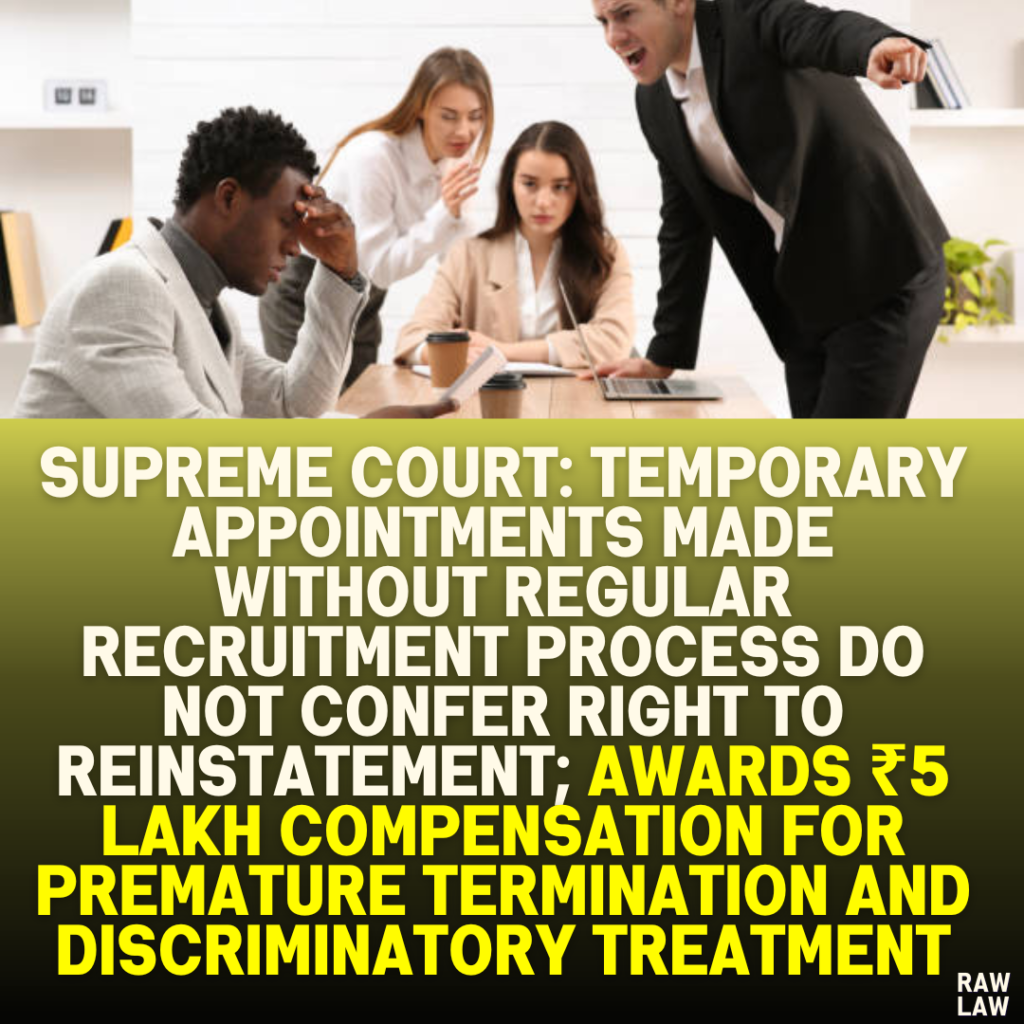Court’s Decision
The Supreme Court overturned the Orissa High Court’s decision to reinstate a computer technician whose temporary appointment was terminated before its expiration. The Court ruled that reinstatement was not justified under the law and awarded ₹5 lakh as a full and final settlement for the discriminatory treatment suffered by the respondent, emphasizing that temporary appointments without following statutory procedures do not confer the right to reinstatement.
Facts
- Engagement of the Respondent:
- The respondent was appointed as a computer technician at the College of Teacher Education, Balasore, under an office order dated 23.04.2001.
- The appointment was purely temporary, lasting either for one year or until the post was filled on a regular basis, whichever was earlier.
- Termination:
- On 22.01.2002, the respondent’s services were terminated without prior notice or an opportunity to be heard.
- Tribunal’s Order:
- The respondent filed a petition before the Orissa Administrative Tribunal, claiming violation of natural justice.
- The Tribunal ruled that the respondent was entitled to salary and allowances only for the remaining period of his contractual term, until 30.04.2002.
- High Court’s Decision:
- The respondent challenged the Tribunal’s decision before the Orissa High Court.
- The High Court set aside the Tribunal’s order and directed reinstatement with all service and financial benefits, reasoning that similarly situated employees had been reinstated.
- Appeal in the Supreme Court:
- The State of Odisha appealed the High Court’s decision, challenging the legal basis for the order of reinstatement.
Issues
- Was the respondent’s termination in violation of principles of natural justice?
- Could the respondent claim reinstatement despite his temporary engagement being non-permanent and without adherence to statutory recruitment procedures?
- Should the respondent be granted parity with similarly reinstated employees?
Petitioner’s Arguments
- Nature of Engagement: The respondent was appointed for a fixed term, with no assurance of permanency. The termination was non-stigmatic and did not violate principles of natural justice.
- No Legal Right to Reinstatement: The respondent’s appointment did not follow any prescribed recruitment process, and he had no legal right to claim reinstatement.
- No Obligation for Parity: Mistakes in reinstating other employees in separate cases could not be used as a basis to justify the respondent’s reinstatement.
- Appropriate Remedy: Even if the termination was premature, compensation, not reinstatement, was the appropriate remedy.
Respondent’s Arguments
- Arbitrary Termination: The termination was arbitrary, lacking any reasons and issued without affording the respondent an opportunity to be heard, thus violating natural justice.
- Discrimination: Similarly situated employees had been reinstated in the past, and the State had failed to provide equal treatment.
- Justified Relief: The High Court’s order was valid as it ensured parity and fairness among similarly situated employees.
Analysis of the Law
- Temporary Engagements and Legal Rights:
- The Court reiterated the principle from Secretary, State of Karnataka v. Umadevi (2006), emphasizing that appointments not made through statutory or constitutional procedures cannot confer a right to reinstatement.
- The respondent’s engagement was purely temporary, for specific work under the UGC Development Grant, and not against a substantive vacancy.
- Violation of Natural Justice:
- The Court acknowledged that the termination lacked procedural fairness but clarified that reinstatement was not an automatic remedy for procedural lapses in temporary appointments.
- Negative Equality:
- Citing State of Odisha v. Anup Kumar Senapati (2019), the Court held that Article 14 of the Constitution does not envisage “negative equality.” Simply because other employees were wrongly reinstated did not mean the respondent was entitled to the same error being repeated.
- Appropriate Relief:
- The Court observed that monetary compensation was a more appropriate remedy for premature termination, especially when the term of engagement had already expired.
Precedent Analysis
- State of Odisha v. Anup Kumar Senapati (2019):
- Reiterated that equality cannot be claimed in cases where a legal right does not exist.
- State of U.P. v. Rajkumar Sharma (2006):
- Held that wrongful appointments or reliefs granted in error cannot form the basis for similar claims by others.
- Secretary, State of Karnataka v. Umadevi (2006):
- Cautioned against regularizing or reinstating temporary or contractual employees whose appointments were not made in accordance with law.
Court’s Reasoning
- No Legal Right to the Post:
- The respondent’s appointment was purely temporary and did not create a legal right for reinstatement, particularly since it was not made through a regular recruitment process.
- Faulty High Court Reasoning:
- The High Court erred by granting relief based on parity with other reinstated employees without independently assessing the legality of the respondent’s claim.
- Mistakes made in other cases could not justify perpetuating the same error.
- Discriminatory Treatment:
- While the respondent’s termination was not unique, the State failed to demonstrate significant distinctions between the respondent’s case and those of reinstated employees, warranting compensation for discriminatory treatment.
Conclusion
The Supreme Court allowed the appeal and quashed the High Court’s order for reinstatement. It directed the State to pay ₹5 lakh as full and final compensation to the respondent for premature termination and discriminatory treatment.
Implications
- Reinforcement of Umadevi Principles:
- Temporary appointees cannot claim a right to reinstatement unless appointed following statutory or constitutional procedures.
- Limited Scope for Negative Equality:
- The judgment curbs the misuse of Article 14 by preventing employees from demanding relief based on errors in unrelated cases.
- Fair Compensation:
- The Court balanced legal principles with fairness, awarding monetary relief for procedural irregularities and discriminatory treatment.




Pingback: Delhi High Court Rules: "Disownment by Parents Through Public Notice Does Not Extinguish Legal Rights; Partition Suit Cannot Be Rejected at Preliminary Stage" - Raw Law